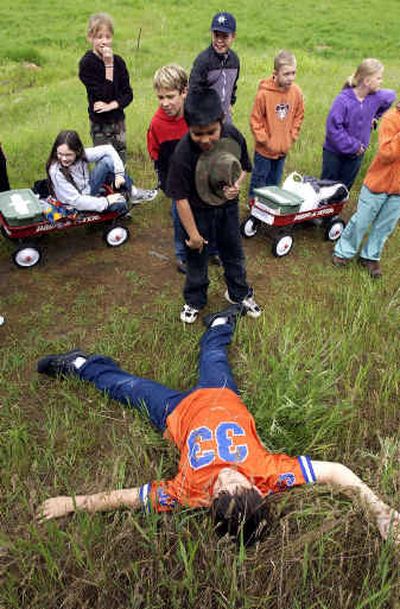Students and egg hit Oregon Trail

The Watson family’s imaginary baby – a raw egg, really – died quickly after birth, a definite sign of the family’s rash behavior and poor decision-making. Borah Elementary fourth-grade teacher Cindi Ulen handed the five Watsons an egg to represent the newborn baby they’d carry on their upcoming Oregon Trail trek re-enactment. It didn’t take long before the egg was sailing from father to daughter to grandmother, and one of them wasn’t gentle enough for the baby.
The Watsons – fourth-graders Nikki Bain , Audra Ross, Emily Shell, Jared Lafontaine and Jesse Lilnberger – didn’t view the tragedy with the proper gravity. But Cindi couldn’t teach them everything. Her students were too excited about embarking on an Oregon Trail journey that promised danger, privation, rugged terrain, possible gunfights and more.
Michele Rutherford, another Borah fourth-grade teacher, created the mock Oregon Trail trip a few years ago. The kids used to explore the pioneer life at Lutherhaven, but the camp cost and tight school-district budgets soon pushed the district to ask students to pay to participate. Borah is in the low- to middle-income section of town and the charge was more than some families could afford.
Michele studied various Oregon Trail educational programs and cherry-picked the best elements for Borah Elementary. She decided red wagons would represent Conestoga wagons, paper coupons would stand in for supplies and uncooked eggs would serve as babies.
Every spring, Michele divides the students into pioneer families – the Watsons, Martins, Bucks, Campbells, etc. Each family gets $1,000 in play money to buy 2,000 pounds or less in supplies for the 2,000 mile cross-country trek. For several years, Tubbs Hill served as the Oregon Trail, but springtime crowds prompted Michele to try the Cougar Bay Nature Conservancy this year.
The kids face rough roads, opportunistic pioneers and the pitfalls of nature based on the cards they draw along the trail.
Sixty kids embarked on this year’s journey and their first hazard – rain – disappeared quickly. The Watsons decided together before the trek began that they needed water, shotguns, food and emergency supplies that added up to 1,394 pounds. Michele and Cindi remind the kids they should keep some money for the trip and for starting up a new home, but some families spend it all and face the consequences on the trail.
The first one is at the trail’s start. A trail keeper in Jesse James dress charges each family to use the trail based on the weight they’re carrying. The wagonmaster, Fannie, takes one look at the threatening character and suggests shooting him. But families decide instead to pay, even though they’re thrilled with the guns in their possession. Emily hands over $2 and the Watsons hit the rough dirt trail that winds into the forested hills surrounding Cougar Bay.
The trail to Oregon forces the Watsons to cross the Platte River, a slight rocky crevice that’s dry despite the rain. Cindi grabs supplies and tosses them or hugs kids and declares them dead. Jesse is lost to the turbulent waters.
“I’m dead!” Jesse says, delighted. He’s unconcerned that he can no longer participate in Watson family decisions, but Nikki is distressed.
“He’s the smart one,” she laments.
They have plenty of decisions to make. As they cross the Rocky Mountains – a steep uphill – they reach stone stairs that stop the wagons. A couple ekes out a living there with a pulley mechanism. They charge $5 to carry each wagon over the rugged terrain. The Watsons pay, but another family loses its wagon when it overturns.
Cindi asks for a moment of silence. The accident killed the Martin family. Everything they had was lost.
“It happens out here,” Cindi says grimly. “We’ve gotta keep moving.”
The Watsons trade with American Indians and buy extra supplies at Fort Laramie along the route. Supplies cost three times more there than they did before the trip. The traveling kids dine on jerky and biscuits Michele and Cindi made the night before. At first, the food is a treat, but it doesn’t go far and the chaperones are eating peanut butter sandwiches and chips they brought from home.
By the time the young pioneers reach Oregon, they’ve solved problems together, shot rubber-band guns at targets representing animals, mourned lost family and managed their family’s budget. They’ve negotiated with the five Project CDA students who fill roles as Fort Laramie shopkeepers and Indians.
And they’ve bickered, as the pioneers most likely did.
“I try not to interfere. There’s a wagonmaster,” Michele says. “And it hasn’t ever come to punches.”
By the way, the Watsons reached Oregon in good form and with money in their pockets. And, they still talk to each other.